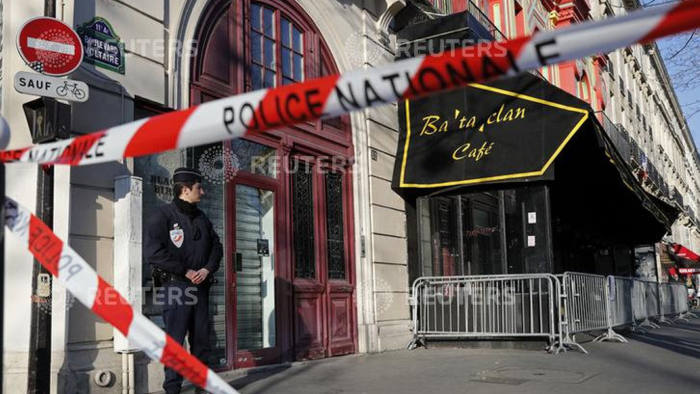
Twenty people charged over 2015 Paris terror attacks
Salah Abdeslam among those indicted over attacks during which 131 people were killed
French anti-terror prosecutors formally indicted 20 suspects for the Islamist attacks that killed 131 people in the Bataclan concert hall and Paris cafés in 2015.
In a 562-page indictment released on Friday, prosecutors requested that 14 people currently in prison or under judicial supervision and another six who are the subject of arrest warrants stand trial for their involvement in the attacks.
Those charged include Salah Abdeslam, the only surviving member of the alleged group of terrorists who directly took part in the killings on the evening of November 13 2015.
The other 19 cited in the indictment are accused of helping organise or fund the attacks. They include members of a France-Belgian jihadi cell behind the 2016 Brussels bombings and Oussama Atar, a Belgian national who rose through the Isis ranks in Syria. Atar may have been killed there in 2017, according to press reports.
The final decision to proceed with a trial, provisionally scheduled for 2021, will be taken by French judges.
A group of suicide bombers and gunmen affiliated to Isis targeted the Stade de France stadium in the north of Paris, bars and restaurants in the centre and killed 90 concertgoers in the Bataclan. It was the deadliest terror attack in western Europe since the Madrid train bombings in 2004.
Abdeslam was arrested in Belgium in March of 2016 having been on the run since the shootings. He was found guilty by a Belgian court in April 2018 of trying to kill police officers in a shootout in Brussels and was sentenced to 20 years in prison.
The Paris attacks followed the killing by three Islamist extremists of 17 people at weekly satirical magazine Charlie Hebdo and a Jewish supermarket in January that year. Then president François Hollande declared a state of emergency after the Bataclan attacks.
From the archive
The Big Read Anne-Sylvaine Chassany
France: the permanent state of emergency
Monday, 2 October, 2017
Paris and other French cities — including Nice on Bastille Day in 2016 — have been hit by other deadly attacks since.
In October this year, a 45-year-old IT professional, who had been working at the Paris police Intelligence Directorate headquarters since 2003 before becoming radicalised, killed four of his colleagues.
In response to that attack, the government has launched a review of how its intelligence services identify signs of radicalisation among officers.
Days after the attack on the police, President Emmanuel Macron spoke of the “hydra” of radical Islamism and called for France to build a “society of vigilance”.
In 2017, Mr Macron turned some provisions of the state of emergency into permanent laws to give police sweeping powers in matters of Islamist terror threats.